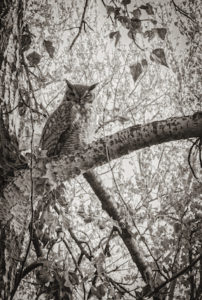
The great horned owls have begun their seasonal call and response—from cottonwoods to ponderosas, their haunting echoes through the backwoods just as the daylight is fading and darkness falls. The owls have been a constant throughout the last few years—their nesting sites down towards the river. I have watched as they roosted in the branches near the house. I awoke one morning to see two piercing yellow eyes staring at me from the tree outside my bedroom window. I have scavenged the ground for their pellets and pulled them apart to find skulls and pelvic bones and reconstructed the skeletons of whatever they had feasted on the last few days.
I even found a dead great horned that had been hit by a car. I took it to the natural history museum at the university and helped the curator prepare it as a teaching specimen. I parted the chest feathers to reveal the patch of soft bare skin where it nestled down on its eggs to warm them, I opened its stomach to reveal the partially digested dove it had consumed just before dying. And inside the dove, the seeds of its last meal.
I watched as an owl dove into the berry garden after a small bird that had wriggled its way into the sweet fruit through a gap in the fence. The owl glided in on silent wings, talons extended, but hit the netting over the garden, tumbled and rolled across the top and finally came to rest on a cross beam, feathers all askew and a confused look on its usually wise face. The little bird quietly hunkered under the blueberry bush, probably wondering at its brush with death.
I found one of my chickens decapitated in the yard—the victim of a great horned owl who is known to crave the brains of its prey. Many Native American cultures consider the owl an omen of death and I was uneasy when they became such an ever-present part of my life. And this year their calls do seem to echo with death. So many deaths of good friends and relations these last few years—my mother, my mother-in-law and my brother-in-law, a couple of Ted’s childhood friends. This fall our neighbor, a surrogate grandfather to my sons who never knew their grandfathers who passed many decades ago. And then, on New Year’s, the sudden death of our friend and the drummer in Ted’s band, Micki Singer, killed in a head-on accident on his way home from a gig. In spite of suffering for years from health problems, he was always eager to share his passion for music and never passed up an opportunity to play.
With no parents still alive and on social security, death seems so much closer than it ever has before. Our future no longer stretches in front of us, full of endless possibility. And yet, I don’t feel like the owls that are haunting me presage death. For I have also seen a pair of owls courting each other, watched as the male fluffed his white chest feathers, cocked his tail and bobbed and nodded, uttering “come hither” calls. I watched as the female spread her wings and bowed, snapping her bill. And then the male flew to her and they clacked beaks. Their calls were quick and urgent, he mounted her and it was over in just seconds.

Later that summer I found their nests and watched day after day as the awkward balls of fluff feathered out and finally fledged, learning to hunt on their own. Great horned owls are among the earliest species of birds to nest and their courting calls begin just as the solstice brings its promise of lengthening daylight and renewal. To hear them calling now reminds me that life and death are intertwined. But I learned from Micki that every day is a chance to do what you love and to not waste a moment of the life we have left.

Peggy, I love your writing, learning about owls, and knowing a bit more about your life. Beautiful, evocative, very “Peggy.”
Peggy, this whole piece, like all your writing, is a quiet gift within another quiet gift — as are you. This part says it all: I parted the chest feathers to reveal the patch of soft bare skin where it nestled down on its eggs to warm them, I opened its stomach to reveal the partially digested dove it had consumed just before dying. And inside the dove, the seeds of its last meal.
This is just beautiful Peggy. Poignant and tender and real. As particularly potent in times like these. Thank you.